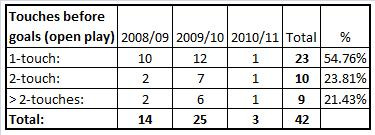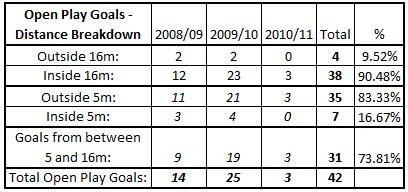Luis Suárez – The Man And The Myths
This article first appeared on The Tomkins Times on 22nd February 2011. Thanks to @bojochris for providing the bulk of the statistics.
No doubt you’ve had similar conversations to me lately.
Me: “Good to see Liverpool have signed a decent striker, he’s scored over 100 goals for Ajax”
Others: “Isn’t he that cheat from the World Cup? Who bit someone? And besides, the Dutch league’s crap”.
Me: *sigh*
Whilst the above issues are true and relevant to varying degrees, how much do any of us really know about Suárez? After all the Dutch league isn’t as widely televised as some overseas football, so I thought I’d look at his stats.
During his career in league football, Suárez has 102 goals in 168 appearances for Nacional (Uruguay), Gronigen and Ajax (Holland) plus of course Liverpool. As well as this, he was the Dutch league’s player of the year in 2009-10, and picked up a couple of man-of-the-match awards at the last World Cup (though presumably not for the game with Ghana). On the face of it, he comes with a good pedigree.
I have obtained a breakdown of his goals for the last two-and-a-half seasons with Ajax, so will be focussing upon this period.
Easy to see why he was player of the year in 2009-10; he was averaging a goal every 85 minutes he was on the pitch, and scored two or more goals in eight of his 33 appearances, a phenomenal record.
What’s interesting is that if you factor in assists as well, then he was involved in goals slightly more regularly the season before, though of course goals are a striker’s main measure of success, and he scored 13 more in 2009-10.
His statistics were noticeably worse this season, but then that’s not unusual for players who play in the latter stages of a World Cup. That said, he still scored more than a goal every two games, so hardly a disastrous return.
To give his tally of 35 in one season in Holland some context against a Premier League player, when calculating who wins the Golden Shoe for Europe's top striker, UEFA apply a co-efficient to each league. The Dutch league is rated at 1.5, so Suárez earned 52.5 points for his 35 goals. The English Premier League is deemed harder to score in, and so has a rating of 2. Therefore, 26 league goals in England is effectively worth the same (on this scale at least).
This means that Suárez's total from 2009-10 would have won the English Golden Boot in six of the last ten seasons, and been runner-up in the other four. As the cliché (kind of) goes, you can only score against what's in front of you, but he's still got an impressive record.
As was noted in an earlier article by Paul Tomkins, Suárez has the style of a right-footed Robbie Fowler, and the stats certainly show he favours that side:
He is also renowned as a dead ball specialist, and he’s already thumped the woodwork in a Liverpool shirt against Wigan Athletic, but the statistics are less conclusive on this front:

Of course these are only for league games, so some free-kicks have likely occurred in other competitions. It's also fair to say I don't know how many free-kicks he actually took, so can't comment on his percentage success rate.
It could be a case of people remembering important free-kick goals too; ask me who Liverpool's best free-kick takers have been, and my mind immediately thinks of Danny Murphy and John Arne Riise - both scored great free-kicks against Manchester United, but didn't repeat the trick all that often.
The following statistics are interesting, as they show if Suárez is likely to create goals himself or not:

They suggest that he doesn't do it all that often. He only scored nine goals that involved him taking more than two touches, so it doesn't suggest he went on many mazy runs with the ball, or if he did, they didn't result in him scoring himself at least.
I’ll finish with a look at what distances Suárez tends to score from. Figures were provided to me in metres, but 16 is essentially 18 yards, and likewise five is six yards:

It appears he doesn’t score a great deal from outside the area in open play, and only relatively few poacher’s finishes from inside the six yard box.
Combining all of this info suggests that he does his best work with his right foot, between six and eighteen yards from goal, with a first time hit. Here’s an example of just how good this combination can be from last year’s World Cup.
Ultimately there’s no guarantee that Suárez will be a success at Anfield, and sceptics can point to Kuyt’s relatively poor goal return for Liverpool when compared to his exploits in Holland, or the Uraguyan’s compatriot Forlan’s failure at one of England’s biggest clubs.
But having only just turned 24, and with this goalscoring record behind him, then he certainly has a good chance. Hopefully then people will discuss his goalscoring record rather than biting or handballs.
Please take a look at my other articles, a list of which can be found here.
